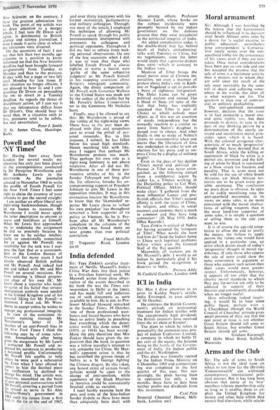Moral armament
Sir: Although I was horrified by the notion that the Government should be inluenced in its decision over South African arms sales by a desire for 'a useful exercise in public education', nevertheless your correspondent 'a Conserva- tive' surely scores over the anti- apartheid lobby for the consistency of his views, even if they are mis- taken. Once moral considerations have been put on one side and one has accepted the premise that the sale of arms is a legitimate activity then it matters not to whom they are sold since the result of the sale must inevitably be the same toll of death and suffering some- where in the world; this after all is what weapons are for. The question is then one of commer- cial or military profitability. The anti-apartheid movement
however, declares that the issue is in fact primarily a moral one, and quite rightly too, but then proceeds to destroy its case in the eyes of any thinking person by a demonstration of the utterly un- sound and inconsistent moral prin- ciples upon which it is based. With the colossal arrogance char- acteristic of so much 'progressive' thought they have decreed that in South Africa, while the killing or oppression of black by white is a mortal sin, terrorism and the kill- ing of white by black is sanctioned as a blow struck for freedom and equality. That is, arms must not be sold for the use of white South Africans, yet black African ter- rorists are to be given every pos- sible assistance. The conclusion we must draw is obvious. In spite of its sickly moralising tone the anti-apartheid movement, in its views on arms sales, is no more concerned with the moral implica- tions of selling weapons than is the most hard-line supporter of arms sales, it is simply a question of selling them to the side you want to win.
It is of course the age-old temp- tation to allow the end to justify the means, the failure to apply passim the values one would have applied in a particular case, an error which drains much of today's 'progressive' thought of moral sig- nificance. If only those who oppose the sale of arms could show the same consistency in argument as those who support such action then their views would earn greater respect. Unfortunately, however, it appears all too often that the chaotic moral standards to which they pay lip-service are only to be adduced in support of their theories and conveniently discarded when no longer useful. How refreshing, indeed 'inspir- ing, it would be to hear some public figure, perhaps even a a Churchman (though the World Council of Churches' attitude gives small promise of this), say that the real point at issue is not whether Great Britain should sell arms to South Africa. but whether Great Britain should sell arms.
Graham Kavanagh 142 Hobs Moat Road, Solihull, Warwicks






















































 Previous page
Previous page